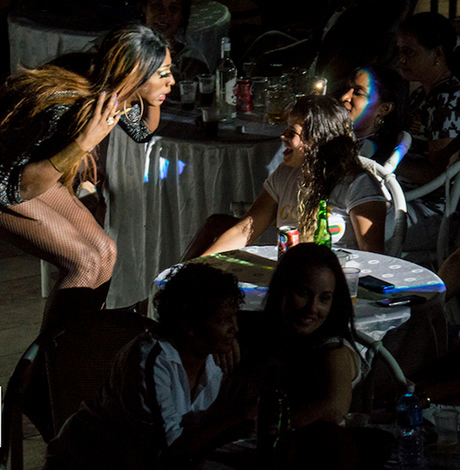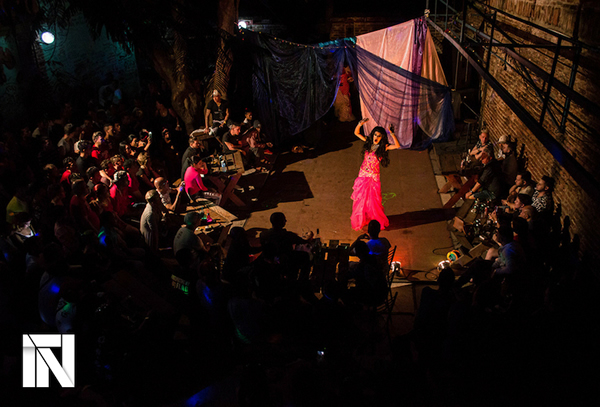News
Una ciudad cubana que no quiere ser gueto
Santa Clara se debate espacios exclusivos para la comunidad LGBT


Una noche de sábado en el Cabaret Cubanacán, de Santa Clara. (Foto por Yariel Valdés González/Tremenda Nota)
Esa nota salió originalmente en el sitio web de Tremenda Nota.
SANTA CLARA, Cuba — Una de las ciudades cubanas más hospitalarias con las personas LGBTI+ también se debate entre la demanda de espacios exclusivos para las minorías sexuales y las desigualdades económicas que crecen en la Isla.
Cada sábado Miguel Antonio Castillo viaja cerca de dos kilómetros para encontrar una discoteca.
En San Diego del Valle, su primer destino, hay pocos lugares para bailar o simplemente disfrutar de espectáculos culturales. Por eso, desde que supo que existía una “noche para las personas LGBTI+” en Santa Clara, la capital de la provincia, Miguel Antonio decidió alargar su travesía por más de 30 kilómetros hasta el Cabaret Cubanacán.
“Las actividades que hacen allá [en San Diego del Valle] son muy generales,” se queja. “Y tampoco hay un día específico para los homosexuales.”
Al joven le seduce que “en las fiestas gais todos son gais.” Además, allí puede “encontrar amigos e intercambiar con personas que tienen gustos sexuales, estéticos o musicales similares, sin riesgo de sufrir homofobia.”
Más allá de las cabeceras municipales cubanas la recreación se reduce a una discoteca improvisada y a un parque central donde la gente se reúne a “cotillear.” Las fiestas concebidas para personas LGBTI+ tampoco son comunes más allá de La Habana y de algunas capitales provinciales.
En la pequeña ciudad de Camajuaní, a 20 kilómetros de Santa Clara, nunca ha prosperado una “fiesta diversa,” aseguran varias personas LGBTI+ entrevistadas por Tremenda Nota.
Según Leonel Jacomino Jiménez, promotor del proyecto Hombres que tienen sexo con otros hombres (HSH), las gestiones para crear un espacio inclusivo “tienen que hacerse sobre la base de cartas y tocando puertas para molestar a algunos funcionarios del gobierno.”
En otros casos, como ocurrió el pasado año en Sagua la Grande, una de las principales ciudades de la provincia, las fiestas LGBTI+ fracasan por falta de público o de buenas estrategias de promoción.
Solo el proyecto itinerante “Me incluyo,” organizado por el promotor cultural Ramón Silverio, creador y director de El Mejunje, ha presentado espectáculos de transformismo y otras actividades inclusivas en poblados y zonas apartadas.
Santa Clara, por su parte, cuenta con tres espacios que celebran las llamadas “fiestas gais,” y que incluyen shows de transformismo. El Centro Recreativo El Bosque, el Cabaret Cubanacán y El Mejunje de Silverio son los únicos lugares que introducen en su cartelera semanal una “noche diversa.”

En la última década las “fiestas diversas” han alcanzado varias ciudades cubanas, aunque todavía La Habana y Santa Clara son las que ofrecen más opciones recreativas “exclusivas” para las personas LGBTI+. (Foto por Yariel Valdés González/Tremenda Nota)
¿Gueto homosexual?
Junto al Cabaret Cubanacán funciona otro espacio recreativo nombrado Disco Isla. Los públicos se muestran segregados cada sábado. De un lado hacen fila las personas gais, trans y lesbianas; del otro aparecen jóvenes heterosexuales que evitan mezclarse con “sus vecinos.” Las personas LGBTI+ permanecen en el gueto “asignado” socialmente.
“La creación de espacios exclusivos genera también una especie de exclusión,” cree Félix Izaguirre, un joven que hace fila para entrar a otra de las “fiestas diversas” de la ciudad.
“Mucha gente no va al Cabaret los sábados ni vienen a El Mejunje, precisamente porque saben que es noche gay,” dice. “Siempre existen heterosexuales que tienen amigos gais y los acompañan sin prejuicios, pero son los menos.”
Ramón Silverio creó hace más de tres décadas el centro cultural El Mejunje, acusado en sus primeros años de ser un “club exclusivo para personas gais.” Sin embargo, la institución sobrevivió el paso del tiempo y, en vez de apartar en un gueto a las personas LGBTI+, abrió las puertas al resto de la sociedad.

El público asiste a un show de transformismo en El Mejunje. (Foto por Yariel Valdés González)
Aun así, muchas personas homosexuales y transgéneros prefieren acudir a “espacios exclusivos para gais.” Javier Olivera, transformista que se presenta en el escenario de El Mejunje como Cinthia, aseguró que en sitios “aparentemente para heterosexuales” suele encontrarse conflictos entre la clientela homofóbica y los gais.
Por eso, Denet Oliva Triana, colega de Javier conocida como Blacuchini, respalda la existencia de lugares dedicados a la comunidad LGBTI+, aunque siente que está “en un círculo” que le lleva siempre al mismo sitio con la misma gente.
Si es caro no es incluyente
A pesar del éxito del Cabaret Cubanacán y del Centro Recreativo El Bosque ― actualmente en reparación ―, el sitio más popular para la comunidad LGBTI+ de Santa Clara sigue siendo El Mejunje, por sus razonables precios y su cercanía al centro de la ciudad.
“Cada uno se divierte donde le permiten sus ingresos,” aseguran varios entrevistados. Las incipientes clases sociales que se consolidan en Cuba hace más de una década también dividen a las minorías sexuales.
Al Cubanacán, al Bosque, van quienes cuentan con mejor economía, pues solo la entrada cuesta como mínimo 25 pesos (1 CUC, equivalente a un dólar). Ese precio, por ejemplo, quintuplica el valor del boleto de entrada a El Mejunje.
En un país donde el salario medio es 767 pesos mensuales (poco más de 30 dólares estadounidenses), “no se puede decir que un lugar sea inclusivo si cobra cuarenta pesos por la entrada,” advierte Ramón Silverio.
Reinaldo Gil, un joven artista plástico, confirma que “al Cubanacán va la gente que tiene un poco más de dinero.” Al principio, cuando acababan de abrir la “noche diversa” en el cabaret, “los mismos trabajadores de allí te discriminaban un poco, existía homofobia.”
“En el Carishow — una céntrica discoteca de la cadena de servicios extrahoteleros Palmares — a veces no aceptan que entren los homosexuales,” denuncia Gil.
Sin embargo, uno de los agentes de seguridad del Carishow aseguró a Tremenda Nota que allí nunca han existido manifestaciones de homofobia y que “se trata a todos los clientes por igual,” en tanto se comporten de acuerdo a “las normas generales establecidas” en el centro recreativo.
Hace algunos meses dos jóvenes fueron expulsados de Efe Bar, en La Habana, supuestamente por besarse dentro del establecimiento privado. También el KingBar, otro centro nocturno bastante frecuentado de la capital, invocó el derecho de admisión para negar la entrada al poeta Norge Espinosa y un grupo de activistas LGBTI+ en 2015.

La transformista Blancuchini (a la izquierda) durante una de sus presentaciones en el Cabaret Cubanacán de Santa Clara (Foto por Yariel Valdés González)
Orlando Reinoso Castillo, barman del bar Tacones Lejanos de El Mejunje, se atreve a asegurar que este resulta el único sitio en la ciudad frecuentado a diario por personas gais que se mezclan sin dificultad con la población heterosexual, o con las chicas trans, o con los “pepillos.”
“A este lugar le llaman el bar de los escachados,” comenta, en alusión a los bajos ingresos de muchos clientes. “Además, aquí vienen las parejas, se besan y no pasa nada. La diversidad es tan natural en El Mejunje como sus ladrillos.”
Kansas
ACLU sues Kansas over law invalidating trans residents’ IDs
A new Kansas bill requires transgender residents to have their driver’s licenses reflect their sex assigned at birth, invalidating current licenses.

Transgender people across Kansas received letters in the mail on Wednesday demanding the immediate surrender of their driver’s licenses following passage of one of the harshest transgender bathroom bans in the nation. Now the American Civil Liberties Union is filing a lawsuit to block the ban and protect transgender residents from what advocates describe as “sweeping” and “punitive” consequences.
Independent journalist Erin Reed broke the story Wednesday after lawmakers approved House Substitute for Senate Bill 244. In her reporting, Reed included a photo of the letter sent to transgender Kansans, requiring them to obtain a driver’s license that reflects their sex assigned at birth rather than the gender with which they identify.
According to the reporting, transgender Kansans must surrender their driver’s licenses and that their current credentials — regardless of expiration date — will be considered invalid upon the law’s publication. The move effectively nullifies previously issued identification documents, creating immediate uncertainty for those impacted.
House Substitute for Senate Bill 244 also stipulates that any transgender person caught driving without a valid license could face a class B misdemeanor, punishable by up to six months in jail and a $1,000 fine. That potential penalty adds a criminal dimension to what began as an administrative action. It also compounds the legal risks for transgender Kansans, as the state already requires county jails to house inmates according to sex assigned at birth — a policy that advocates say can place transgender detainees at heightened risk.
Beyond identification issues, SB 244 not only bans transgender people from using restrooms that match their gender identity in government buildings — including libraries, courthouses, state parks, hospitals, and interstate rest stops — with the possibility for criminal penalties, but also allows for what critics have described as a “bathroom bounty hunter” provision. The measure permits anyone who encounters a transgender person in a restroom — including potentially in private businesses — to sue them for large sums of money, dramatically expanding the scope of enforcement beyond government authorities.
The lawsuit challenging SB 244 was filed today in the District Court of Douglas County on behalf of anonymous plaintiffs Daniel Doe and Matthew Moe by the American Civil Liberties Union, the ACLU of Kansas, and Ballard Spahr LLP. The complaint argues that SB 244 violates the Kansas Constitution’s protections for personal autonomy, privacy, equality under the law, due process, and freedom of speech.
Additionally, the American Civil Liberties Union filed a temporary restraining order on behalf of the anonymous plaintiffs, arguing that the order — followed by a temporary injunction — is necessary to prevent the “irreparable harm” that would result from SB 244.
State Rep. Abi Boatman, a Wichita Democrat and the only transgender member of the Kansas Legislature, told the Kansas City Star on Wednesday that “persecution is the point.”
“This legislation is a direct attack on the dignity and humanity of transgender Kansans,” said Monica Bennett, legal director of the ACLU of Kansas. “It undermines our state’s strong constitutional protections against government overreach and persecution.”
“SB 244 is a cruel and craven threat to public safety all in the name of fostering fear, division, and paranoia,” said Harper Seldin, senior staff attorney for the ACLU’s LGBTQ & HIV Rights Project. “The invalidation of state-issued IDs threatens to out transgender people against their will every time they apply for a job, rent an apartment, or interact with police. Taken as a whole, SB 244 is a transparent attempt to deny transgender people autonomy over their own identities and push them out of public life altogether.”
“SB 244 presents a state-sanctioned attack on transgender people aimed at silencing, dehumanizing, and alienating Kansans whose gender identity does not conform to the state legislature’s preferences,” said Heather St. Clair, a Ballard Spahr litigator working on the case. “Ballard Spahr is committed to standing with the ACLU and the plaintiffs in fighting on behalf of transgender Kansans for a remedy against the injustices presented by SB 244, and is dedicated to protecting the constitutional rights jeopardized by this new law.”
National
After layoffs at Advocate, parent company acquires ‘Them’ from Conde Nast
Top editorial staff let go last week

Former staff members at the Advocate and Out magazines revealed that parent company Equalpride laid off a number of employees late last week.
Those let go included Advocate editor-in-chief Alex Cooper, Pride.com editor-in-chief Rachel Shatto, brand partnerships manager Erin Manley, community editor Marie-Adélina de la Ferriére, and Out magazine staff writers Moises Mendez and Bernardo Sim, according to a report in Hollywood Reporter.
Cooper, who joined the company in 2021, posted to social media that, “Few people have had the privilege of leading this legendary LGBTQ+ news outlet, and I’m deeply honored to have been one of them. To my team: thank you for the last four years. You’ve been the best. For those also affected today, please let me know how I can support you.”
The Advocate’s PR firm when reached by the Blade said it no longer represents the company. Emails to the Advocate went unanswered.
Equalpride on Friday announced it acquired “Them,” a digital LGBTQ outlet founded in 2017 by Conde Nast.
“Equalpride exists to elevate, celebrate and protect LGBTQ+ storytelling at scale,” Equalpride CEO Mark Berryhill said according to Hollywood Reporter. “By combining the strengths of our brands with this respected digital platform, we’re creating a unified ecosystem that delivers even more impact for our audiences, advertisers, and community partners.”
It’s not clear if “Them” staff would take over editorial responsibilities for the Advocate and Out.

In an official statement released at the reveal event Capital Pride Alliance described its just announced 2026 Pride theme of “Exist, Resist, Have the Audacity” as a “bold declaration affirming the presence, resilience, and courage of LGBTQ+ people around the world.”
The statement adds, “Grounded in the undeniable truth that our existence is not up for debate, this year’s theme calls on the community to live loudly and proudly, stand firm against injustice and erasure, and embody the collective strength that has always defined the LGBTQ+ community.”
In a reference to the impact of the hostile political climate, the statement says, “In a time when LGBTQ+ rights and history continue to face challenges, especially in our Nation’s Capital, where policy and public discourse shape the future of our country, together, we must ensure that our voices are visible, heard, and unapologetically centered.”
The statement also quotes Capital Pride Alliance CEO and President Ryan Bos’s message at the Reveal event: “This year’s theme is both a declaration and a demand,” Bos said. “Exist, Resist, Have Audacity! reflects the resilience of our community and our responsibility to protect the progress we’ve made. As we look toward our nation’s 250th anniversary, we affirm that LGBTQ+ people have always been and always will be part of the United States’s history, and we will continue shaping its future with strength and resolve,” he concluded.


















